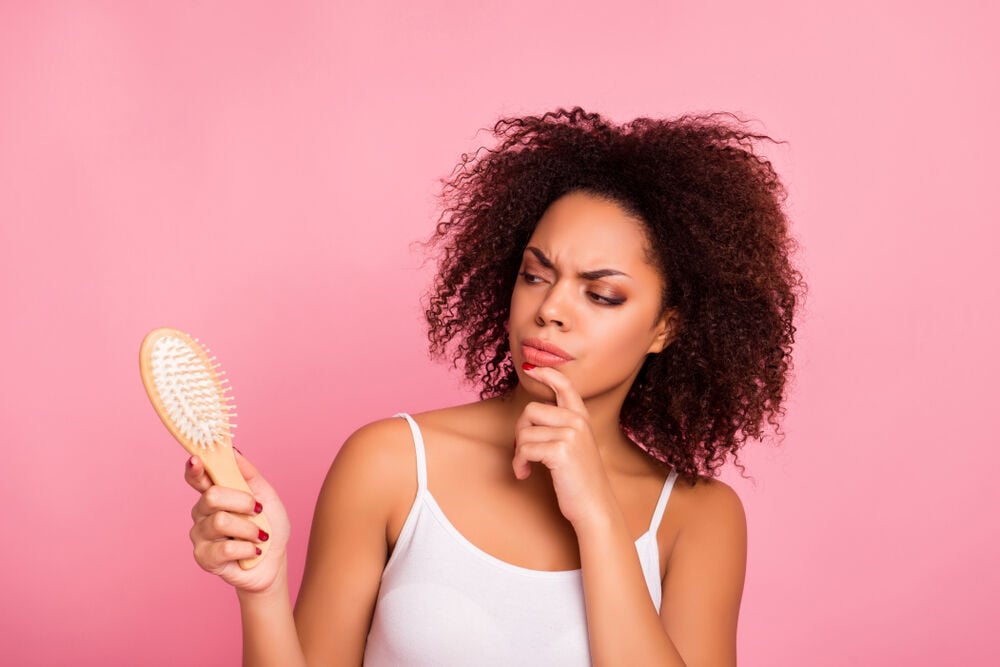If you’re pregnant and experiencing hair loss, you may be wondering whether there is a connection. Though being pregnant does not necessarily mean you will lose hair (you may actually find it grows more easily), hair loss early in pregnancy can be related to hormones, stress, or underlying health issues. Read on to learn about hair loss and how to both treat and prevent it during pregnancy.
-
Tracking cycle
-
Getting pregnant
-
Pregnancy
-
Help Center
-
Flo for Partners
-
Anonymous Mode
-
Flo app reviews
-
Flo Premium New
-
Secret Chats New
-
Symptom Checker New
-
Your cycle
-
Health 360°
-
Getting pregnant
-
Pregnancy
-
Being a mom
-
LGBTQ+
-
Quizzes
-
Ovulation calculator
-
hCG calculator
-
Pregnancy test calculator
-
Menstrual cycle calculator
-
Period calculator
-
Implantation calculator
-
Pregnancy weeks to months calculator
-
Pregnancy due date calculator
-
IVF and FET due date calculator
-
Due date calculator by ultrasound
-
Medical Affairs
-
Science & Research
-
Pass It On Project New
-
Privacy Portal
-
Press Center
-
Flo Accuracy
-
Careers
-
Contact Us
Hair Loss During Pregnancy: How to Take Care of Hair Loss in Pregnancy


Every piece of content at Flo Health adheres to the highest editorial standards for language, style, and medical accuracy. To learn what we do to deliver the best health and lifestyle insights to you, check out our content review principles.
Do you lose hair during pregnancy?
Women notice a number of changes to their hair during pregnancy. Some lose hair, and some notice their hair becomes shinier and stronger. This is caused by higher levels of estrogen, which can stimulate hair follicles. Others may find that their normally curly hair becomes straight or vice versa.
Take a quiz
Find out what you can do with our Health Assistant
Some women do experience hair loss during pregnancy, noticing that their hair is thinning or falling out more. This can begin during pregnancy and continue postpartum. Hair loss can be concerning, and while it is usually a temporary result of shifting hormones or the normal stresses of pregnancy, hair loss in pregnancy can also be a sign of a more serious medical condition.
Is hair loss a sign of pregnancy?

Since hair loss more typically occurs after pregnancy and not during, it should not be considered a sign that you are pregnant. For some women, hair loss during early pregnancy may be stress- or hormone-related.
It’s important to understand how hair growth functions at any given time. All hair goes through a lifecycle. While 90 percent of your hair is in a growth process, the other 10 percent is in a resting phase. The resting hair falls out every two to three months, making room for new hair to grow. So some hair loss on a regular, ongoing basis happens to everyone.
For some women, hair loss during early pregnancy may be stress- or hormone-related.
But if you’re in the early months of pregnancy and finding excessive amounts of hair falling out, stress and hormones could be to blame. The first trimester can be a stressful time for the body, as hormones change to accommodate the developing baby. This stress, in turn, can cause upwards of 30 percent more hair on your head to move into the resting phase. This means you could see more hair than usual falling out. Called telogen effluvium, this condition can appear early on in pregnancy or may appear in the early second trimester or after childbirth.
Hormone-related hair loss is nothing to be concerned about, as it generally resolves within less than six months. You won’t experience permanent hair loss as a result.
What hair loss during pregnancy is considered normal?
In addition to hormone-related hair loss during pregnancy, there are some other causes of hair loss during pregnancy that are perfectly normal.
It’s possible, during pregnancy or any other time, to have hair loss from trauma to the hair follicles themselves. Wearing your hair in tight ponytails or buns all the time can cause hair loss. Certain beauty treatments can also cause your hair to fall out.
If hair is treated harshly, it can cause traction alopecia, which is hair loss caused by pulling on your hair excessively. If this is happening, try wearing your hair down more often or switching styles every few days to avoid putting hair repeatedly in the same tight style. Because traction alopecia can cause permanent hair loss, it’s important to recognize the signs and stop the practice before any lasting damage is done.
The most common time women experience hair loss is in the months following childbirth. This postpartum hair loss is not the same as other types of hair loss. It’s caused by the sudden drop in estrogen following delivery. Although it may be shocking to see hundreds of hairs falling out every time you wash your hair, this is a very normal experience and one that usually resolves within six months or so.
Causes of hair loss during pregnancy
Hair loss during pregnancy can also be the result of underlying chronic or unaddressed health issues. Two of the most common causes of hair loss related to chronic health issues are thyroid disorders and low iron.
If your thyroid is overactive, you may experience hyperthyroidism, a condition characterized by a large range of symptoms including possible hair loss. The same is true of hypothyroidism, when your thyroid produces too little hormones. These conditions can affect women while they’re pregnant or afterwards. Hypothyroidism, which is the more common condition, affects up to 3 percent of women during pregnancy. Symptoms can include sensitivity to cold, weight gain, constipation, and intense fatigue. After delivery, around 5 percent of women develop postpartum thyroiditis. If you suspect you have an underlying thyroid condition, see your doctor, who will order the proper blood tests to determine the cause of your symptoms.
Low iron is another common cause of hair loss, particularly during pregnancy. Although your body always needs iron, this is especially true during pregnancy, when your blood supply surges to deliver blood and oxygen to the baby.
Most experts agree that you need a certain amount of iron per day depending on your age and sex: 8 milligrams per day for girls 9–13 years old, 15 milligrams per day for girls 14–18 years old, 18 milligrams per day for women 18–50 years old, and 8 milligrams per day for women 51 and older. For these reasons, and because iron is primarily found only in specific food groups, anemia can occur during pregnancy. Along with hair loss, those with low iron may also have headaches, fatigue, and chest pain or a fast heartbeat.
Hair loss during pregnancy can also be caused by an underlying autoimmune condition such as rheumatoid arthritis, polycystic ovary syndrome, or an inherited hair loss pattern.
Low iron is another common cause of hair loss, particularly during pregnancy. Although your body always needs iron, this is especially true during pregnancy, when your blood supply surges to deliver blood and oxygen to the baby.
Female pattern baldness, or androgenic alopecia, happens when the growth phase of the lifecycle is slow, causing more time to pass before new hair is produced. Usually, androgenic alopecia is treated with medication designed to regrow hair.
Another condition that causes hair to fall out is alopecia areata. Typically appearing as part of an autoimmune condition, this type of hair loss can be permanent, as your immune system attacks the hair follicles, mistaking them for unhealthy cells. With alopecia areata, hair often falls out in patches, usually on the scalp, although they can appear anywhere there is hair on the body. Although there is no cure for the condition, treating and improving the autoimmune condition can, in many cases, also improve the hair loss.
Treating hair loss during pregnancy
If you’re pregnant and experiencing hair loss because of stress or hormones, or if you are in the postpartum phase, there may not be anything special you need to do. In these conditions, time is most often what’s needed.
If you do feel there is an underlying condition, a professional can help you navigate the choices to find the best and safest treatment for you. Some treatments for hair loss, such as minoxidil, are not considered safe during pregnancy. On the other hand, medications such as levothyroxine, used to treat hypothyroidism, can be safely taken, as it has been categorized by the FDA as having no proven increase in the frequency of malformations or harmful effects on the fetus. Given the different types of treatments available, speaking with your doctor is the first step in coming up with an actionable and safe plan for treating hair loss while pregnant.
Preventing hair loss during pregnancy
Preventing hair loss may not always be possible, but there are certain behaviors that may make a difference. Two of the best methods include making healthy diet and lifestyle choices and watching for any potential underlying health conditions. Eating a whole foods diet consisting of plenty of fresh fruits and vegetables, healthy meats, and eggs, with limited processed and sugary foods, is a great first step. This kind of diet will give you more energy and keep anemia at bay. Maintaining a lifestyle that includes a daily dose of fun and relaxing activities can also help you manage stress, an excess of which can aggravate autoimmune conditions and thyroid disorders.
In addition, it’s important to watch for signs that you may be dealing with something more serious than normal pregnancy or post-pregnancy hair loss. Although you may feel tired and generally not great at times during your pregnancy, particularly in the first trimester, feelings of extreme exhaustion, coupled with symptoms such as intense mood swings and hair loss, could signal an underlying condition. Catching such symptoms early will help you manage and treat thyroid or autoimmune conditions sooner.
The takeaway
For many, hair loss is a normal part of pregnancy, particularly during the postpartum period. It will normally resolve with time, usually between six months and a year. Even if there is an underlying condition, a doctor can help you find and treat the cause, and hair loss is not likely to be permanent. If, however, you feel your hair loss is excessive or it’s accompanied by other persistent symptoms, speak to your doctor to get to the bottom of it.


Hey, I'm Anique
I started using Flo app to track my period and ovulation because we wanted to have a baby.


The Flo app helped me learn about my body and spot ovulation signs during our conception journey.


I vividly
remember the day
that we switched
Flo into
Pregnancy Mode — it was
such a special
moment.
Real stories, real results
Learn how the Flo app became an amazing cheerleader for us on our conception journey.
References
History of updates
Current version (06 October 2020)
Published (09 December 2019)
In this article

Get your personal guide to pregnancy with the Flo app
-
Follow your baby's growth week by week
-
Get expert info on symptoms, safe foods, and more
-
Chat with other parents-to-be




